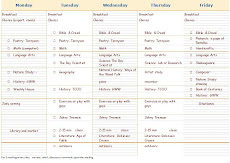- Math
- Religion
- Literature
- Language Arts
- History
- Geography
Day Three:
- Logic
- Science
- Nature Study
- Art
(These "days" will look different for different kids. I will try to do Kieron's review on M/T/W. Sean won't be here during those days. He will be here next week, but we will have various things going on, so his review is partly taking place this week (hopefully ---) and then I'll try to tie things up on Tuesday of next week. But I don't have high hopes; we may have to extend his till Monday after Thanksgiving, or just carry over altogether.)
For the structure of these days, I am thinking:
- Something to Love
- Something to Do
- Something to Think About
I am trying to plan up some sort of checklist for this. Of course!
Since it is his first time at this, I'm envisioning it as more of a "recollecting" time.... a time to sit together and reinforce old connections, and make some new ones. "Here's the story of the Great Fire ..... do you remember that? What do you remember?" -- like an interactive interview.
We've done exams before a la CM, with my older set, though never entirely to my satisfaction. I think that is part of the reason we didn't keep up with them consistently..... like an examination of conscience, an examination is revelatory, and that is uncomfortable. It works better for both if you think of them as an entrance, a step into a new place. I am trying to acknowledge ahead of time that I won't be satisfied, that I will find gaps in expression and understanding, and that this is valuable knowledge in itself, worthwhile for the future.
Charlotte Mason emphasized that her exams weren't meant to find out what the students DON'T know, but what they DO know. Exams were also a key element in the Ignatian classical system. With them, as I understand it, the emphasis was less on affirmation and more on accountability. But please realize that these are not dichotomies -- one does not exclude the other. Charlotte Mason did emphasize accountability, on a continuum that looked different at a higher level than it did at an elementary level. The Ignatian schools were secondary/tertiary institutions. There are always going to be, very appropriately, more exterior expectations for a young adult than for a child.
A few more things to consider (I'm adding them on as I think of them):
- Collect and organize all the photos of his projects. See if he wants to caption them or discuss/narrate them.
- Take photos of key pages of his various workbooks.
- Devise a checklist that shows what he has mastered, what is emerging, and what is still not there. (this is special-educationalese, but I've found it useful -- if you want to wade through this bulky pdf Kindergarten Readiness Initiative, there is an example there).
- Use some of these portfolio checklists.
- Ask him to list or describe his informal learning or favorite times from the past couple of months.
- Music Game? (play first few notes and ask him to ID the song or piece -- probably not this term, but maybe next time)
- Make index cards or notebook pages that will serve as "fact sheets" -- summaries of various processes, or facts, or whatever. An alternative would be posters.



No comments:
Post a Comment